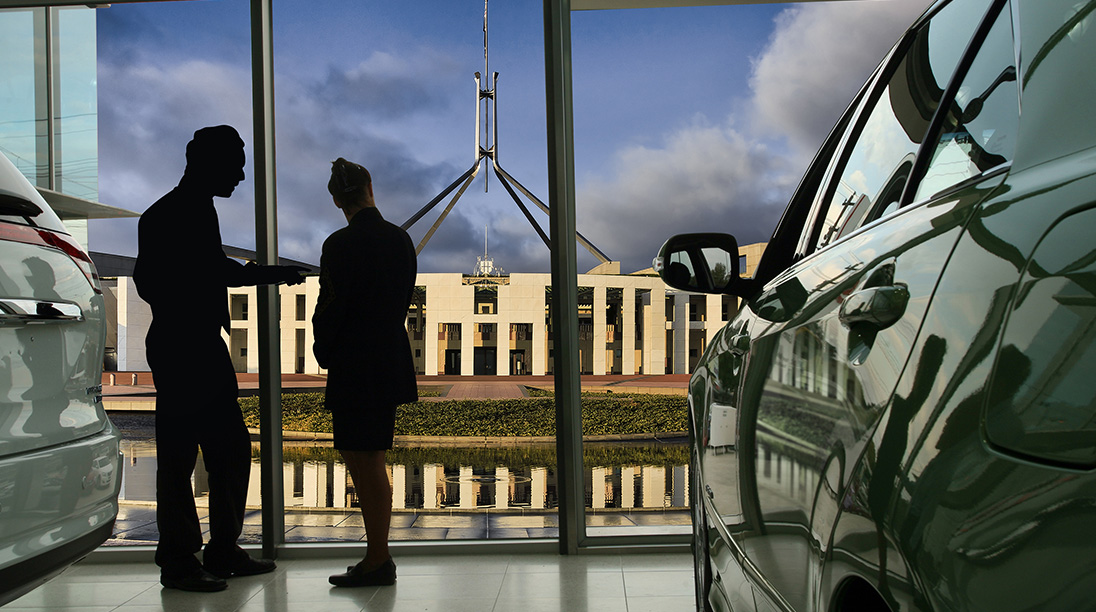Under the banner “Driving Our Future”, the campaign will focus on the four key issues that are critical to the immediate future of new-car dealers in Australia:
- The need for an Automotive Industry Code of Conduct that addresses power imbalances between manufacturers and dealers
- A modern automotive taxation system to encourage affordable cars
- The need to rule out used-car imports
- A consumer focused emissions policy.

AADA chief executive David Blackhall said in a statement: “Our industry is at a crossroads. New-car sales are down and profitability of dealers is declining. It is crucial that candidates clearly outline their plans for our industry.
“We need to remind candidates and voters that new-car dealers are important businesses, which make a total economic contribution of almost $14 billion and employ 60,554 people, including 4844 apprentices in electorates across Australia.
“Throughout this campaign we will be talking to candidates to ensure they hear our concerns, and will be using every means at our disposal, including direct contact, social media and mainstream media, to take our message to the voters,” he said.
Mr Blackhall told GoAutoNews Premium: “We are sending out our infographics in the 30 key marginal seats. We are sending all that material both digitally and in some cases hard copies to the sitting member and the major opposition candidates.
“We have a list of 30 of the most marginal and they are getting all that material.
“Then we are going start AADA member discussions with each of those politicians we can get to as we work our way down the list.
“We have already done a couple and they have worked out really well. The local MP quite often knows the operator of the dealership and if you can get them together in the dealership environment it makes for pretty good (communication).
“We are trying to keep it simple,” Mr Blackhall said. ‘We have those four themes which tie into everything that we have been doing and we are just going to keep hammering away at those four themes under that banner of “Driving our future” and just keep engaged; with both sides, of course.”
The AADA is also updating its DealerNomics website to include more in-depth data and has added new information on the number of apprentices that dealers employ in each electorate as well as the combined donations dealers in that electorate make to their communities.
The manifesto highlights the issues the AADA and its dealer members will be putting before the candidates who, via the DealerNomics website, will have a greater understanding of the full economic and social impact dealers have within electorates around Australia.

The four cornerstones of the campaign are:
1: A FAIRER AUTOMOTIVE INDUSTRY
“Australia’s new-car dealers are all franchised to offshore multinational automotive manufacturers. The relationship between manufacturers and new-car dealers is characterised by an imbalance in power which disadvantages both dealership businesses and consumers who purchase new vehicles from dealers.
“Australia needs an industry-specific Automotive Industry Code of Conduct to protect the important contribution which franchised new-car dealers make to Australia.”
2: AFFORDABLE NEW CARS
“Federal taxes on new cars, such as the import tariff and the luxury car tax (LCT) disadvantage consumers seeking to buy new cars which deliver safety, environmental and fuel efficiency benefits. These legacy taxes were introduced in an era when Australia still manufactured passenger cars and to maintain them only disadvantages consumers and local businesses.
“Australia needs to modernise its automotive taxation regime to encourage affordable safe, clean and efficient new cars.”
3: RULE OUT USED-CAR IMPORTS
“There are significant consumer and safety risks associated with importing used vehicles which essentially have no traceable history. Unbeknown to a car buyer, used vehicles coming in from abroad may be subject to a recall, could have been affected by hail or flood damage or could have a false odometer reading.
“Australia needs to rule out used-car imports to ensure high standards of safety and consumer welfare.”
4: CONSUMER-FOCUSED EMISSIONS POLICY
“Over the past 15 years, new vehicles in Australia have dramatically reduced their emissions and will continue to do so as manufacturers respond to the market.
“Regulations seeking to reduce vehicle emissions should avoid dramatic price increases and restriction of choice, as this may lead to reduced new-car sales which will hurt industry and result in poor environmental outcomes.
“Australia needs a vehicle emissions policy which does not significantly increase car prices and restrict consumer choice.”
By John Mellor













 Read More: Related articles
Read More: Related articles

